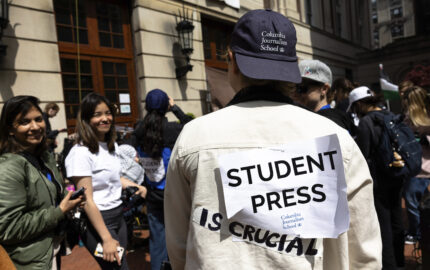
According to the Committee to Protect Journalists’ most recent census, China is the world’s leading jailer of journalists, with 49 imprisoned as of December 2015. Of those 49, at least 14 are Uyghurs—a startling proportion given that the Turkic-speaking Muslim ethnic group, living in the country’s northwest Xinjiang Uyghur Autonomous region, makes up less than one percent of the country’s population. That disproportionation, however, is less surprising to those familiar with the long-fraught relationship between the Uyghur people and China’s authoritarian government.
Uyghurs, unlike the rest of China’s 55 officially designated minority groups (with the other exception being the Tibetans), have a history, albeit a short one, as an independent nation. The region gained independence as the East Turkestan Republic in 1933 and again, after being sacked by the Chinese Muslim army during the Kumul Rebellion, in 1944. The Silk Road region officially came under Communist rule when the party took control of China in 1949.
Since then, the state has sponsored mass migration of the Han Chinese, China’s predominant ethnic group, to Xinjiang to support economic development; Han now comprise nearly half the region’s population. Meanwhile, the country’s central government has increasingly portrayed Uyghur separatists, who seek to govern themselves and call the Xinjiang region East Turkestan, as terrorists—claims that many human rights activists say are exaggerated and an excuse to justify oppressive policies that curtail Uyghur commercial and cultural activities. There are restrictions on Islamic religious practices, and Uyghur language instruction in schools is being phased out. Reports from the region chronicle a pattern of abuse that includes imprisonment, torture, and disappearances.
Tensions came to a head in July 2009 during a major period of discord between Uyghurs and Han Chinese. A series of riots in Urumqi, Xinjiang’s capital, left nearly 200 people dead, Chinese authorities reported, most of them Han. In the wake of the incident, thousands of Uyghurs were arrested and detained, including a number of citizen bloggers who are among the country’s currently imprisoned journalists, and others—as many as 10,000, according to exiled Uyghur leader Rebiya Kadeer—simply disappeared.
The treatment of citizen journalists in the wake of the riots was a familiar story. Uyghurs’ access to the outside world is severely limited—following the unrest, the government enforced a complete Internet and cell service blackout in the region for close to a year—and those trying to disseminate information outside of the vague, incomplete reporting from the state-run media face severe sanctions. Even Uyghurs reporting on the region from abroad are not exempt; Chinese authorities tried to intimidate D.C.-based Radio Free Asia journalist Shohret Hoshur to abandon his reporting on Uyghurs by detaining three of his brothers still living in Urumqi and charging them with leaking state secrets (two of the brothers were released in December). Hoshur has not been deterred, however; this summer, he told The New York Times he feels an obligation to continue reporting on his homeland.
Greg Fay, project manager of the Uyghur Human Rights Project, a nonprofit started in 2004 to promote human rights and democracy for the Uyghur people, talked with Nieman Reports about the heavy restrictions on Uyghur journalism. Below are edited and condensed excerpts of that conversation:
What do we know about the 17 Uyghur journalists—and possibly many more—that are currently imprisoned?
Really very little. Most of them, their prison sentences are not up, but we don’t know the status of many of them. That’s pretty par for the course; it’s very difficult for us to get word from people who are out of prison because the last thing they want to do is violate this extreme restriction on information about the Uyghur people that China enforces so strictly.
One prominent Uyghur scholar/citizen journalist imprisoned is the Bejing-based professor Ilham Tohti. His website was a little different from the Uyghur websites operating at the time because his website was in Chinese. His purpose was to encourage communication between Han Chinese, Uyghurs, and all ethnic groups in China; he was trying to create a forum in which people could interact with one another and learn about issues impacting the region. He was arrested after the riots but later released and forced to move his website to overseas servers, but last year, he was imprisoned and sentenced to life, charged with separatism. That was really the nail in the coffin of this Uyghur citizen journalist movement.
Heavy government restrictions and tight control of information make independent reporting difficult in all of China. In what ways is the Uyghur region unique?
The decimation of the Uyghur Web in 2009 is really unique. The government flicked a switch and cut off all Internet access in this region for 10 months [after the riots], from July 2009 to May 2010, and in doing so also took down all of the most popular Uyghur websites, places where these important conversations about the unrest were taking place. In general, it’s just more difficult for people to access certain tools that are available elsewhere in China, like tools to circumvent the Chinese firewalls or Sina Weibo, the Chinese microblog. We’ve had Uyghur people reporting difficulties accessing these sites, even registering their Uyghur-sounding names, and when they go to post things, we’ve heard reports of lag times of weeks and sometimes it just won’t go up [at all]. That goes far above and beyond what Chinese users experience elsewhere.
And though state-run media across China is heavily restricted, sometimes journalists have a bit more leeway, but you just don’t hear about state journalists in the Uyghur region crossing any lines. Media elsewhere in China don’t really report on Uyghur issues because they acknowledge that this is one area that is simply off-limits.
What challenges do foreign journalists reporting on the Uyghur region face?
There are plenty of restrictions even to get into the region. No international outlets have a bureau in the region or any reporters stationed there. I think also part of what’s really necessary for conducting journalism in China is to have news assistants [such as translators and mediators] regionally, and I think that would be a real challenge for someone to do that in the Uyghur region. There have been several news outlets that have tried to do critical reporting and they have just found that access is so limited; they’re trailed and harassed by authorities, especially when some kind of sensitive incident has taken place. And were these journalists to get access, it would be extremely dangerous for anyone who spoke to them. There have been cases of reprisals facing people who have reported on issues in the region and anybody who is brave enough to act as a source would be putting themselves and their families at risk.
[Following the riots], the U.S. media did its best to try to figure out what was going on at that time, but their access was extremely limited. Foreign media was trying to get the story but, at the end of the day, the kind of hard, investigative reporting that you would really need to find out what happened, particularly to the hundreds of Uyghur individuals who disappeared after the incident, who were rounded up, who were imprisoned—that never happened. There are still many, many questions surrounding those events: reports of extrajudicial killings, reports of lack of due process, and disappearances.
How does the persecution of Uyghur journalists mirror the Chinese government’s treatment of the Uyghur population as a whole?
It’s very reflective of the kind of small space Uyghur people have for freedom of expression. The suppression of journalists prevents not only the outside world but even people in the Uyghur region from knowing what’s going on. What’s going on now is an intensified crackdown on religious practice, limits on mobility and the ability to get a passport; there’s even been an introduction in the region of a new form of identification card that will prevent people from moving between cities. So these other freedoms—freedom of assembly, freedom of expression, freedom of religion—are all made that much more vulnerable by the silencing of Uyghur journalists.
How essential is a free press in promoting peace in the region?
I think it’s absolutely essential. Without a free press, people have no means of expressing what’s going on. There’s rapid change taking place in the Uyghur homeland and Uyghur people generally have very little say over what’s happening and how it’s happening. Taking away the mechanisms through which people can discuss these changes and make known how they would like to see development of their homeland take place is going to lead to unrest.


